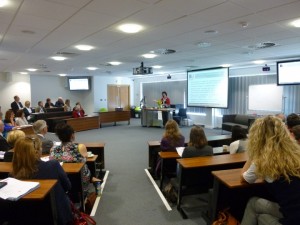 Bournemouth University Dementia Institute (BUDI) held its third open meeting at the university on 14th May, with this year’s theme being dementia friendly environments. The day was well attended by practitioners, family carers, the general public and people with dementia. It started with a lovely buffet lunch sponsored by Alzheimer Research UK, providing an opportunity for delegates to network and to browse the information stands hosted by themselves and BUDI Ph.D. students. The open meeting was formally opened by Professor Gail Thomas who praised the innovative work being carried out by the BUDI team. Delegates then heard presentations from Dr Fiona Kelly on dementia friendly design, Dr Jan Wiener on the use of eye tracking technology to explore navigation skills and difficulties, Kathrin Büter on using computer technology to support dementia friendly design in hospitals. This session closed with a presentation by architect Niall McLaughlin on his work with communities and older people to design care homes that meet everyone’s needs and are inspirational, therapeutic spaces. The final part of the day involved a question and answer session where delegates and presenters discussed some of the issues raised during the day including how to ensure that the concept of good design filters down to those commissioning, designing and using buildings that people with dementia also use. This successful event is sure to have got people thinking and sharing some of what they heard and we look forward to holding similar events in the future.
Bournemouth University Dementia Institute (BUDI) held its third open meeting at the university on 14th May, with this year’s theme being dementia friendly environments. The day was well attended by practitioners, family carers, the general public and people with dementia. It started with a lovely buffet lunch sponsored by Alzheimer Research UK, providing an opportunity for delegates to network and to browse the information stands hosted by themselves and BUDI Ph.D. students. The open meeting was formally opened by Professor Gail Thomas who praised the innovative work being carried out by the BUDI team. Delegates then heard presentations from Dr Fiona Kelly on dementia friendly design, Dr Jan Wiener on the use of eye tracking technology to explore navigation skills and difficulties, Kathrin Büter on using computer technology to support dementia friendly design in hospitals. This session closed with a presentation by architect Niall McLaughlin on his work with communities and older people to design care homes that meet everyone’s needs and are inspirational, therapeutic spaces. The final part of the day involved a question and answer session where delegates and presenters discussed some of the issues raised during the day including how to ensure that the concept of good design filters down to those commissioning, designing and using buildings that people with dementia also use. This successful event is sure to have got people thinking and sharing some of what they heard and we look forward to holding similar events in the future.











 Beyond Academia: Exploring Career Options for Early Career Researchers – Online Workshop
Beyond Academia: Exploring Career Options for Early Career Researchers – Online Workshop UKCGE Recognised Research Supervision Programme: Deadline Approaching
UKCGE Recognised Research Supervision Programme: Deadline Approaching SPROUT: From Sustainable Research to Sustainable Research Lives
SPROUT: From Sustainable Research to Sustainable Research Lives BRIAN upgrade and new look
BRIAN upgrade and new look Seeing the fruits of your labour in Bangladesh
Seeing the fruits of your labour in Bangladesh ECR Funding Open Call: Research Culture & Community Grant – Apply now
ECR Funding Open Call: Research Culture & Community Grant – Apply now ECR Funding Open Call: Research Culture & Community Grant – Application Deadline Friday 12 December
ECR Funding Open Call: Research Culture & Community Grant – Application Deadline Friday 12 December MSCA Postdoctoral Fellowships 2025 Call
MSCA Postdoctoral Fellowships 2025 Call ERC Advanced Grant 2025 Webinar
ERC Advanced Grant 2025 Webinar Update on UKRO services
Update on UKRO services European research project exploring use of ‘virtual twins’ to better manage metabolic associated fatty liver disease
European research project exploring use of ‘virtual twins’ to better manage metabolic associated fatty liver disease